User:Alex34342/sandbox
| This article is part of a series on the |
| United States House of Representatives |
|---|
 |
| History of the House |
| Members |
|
|
| Congressional districts |
| Politics and procedure |
| Places |
|
|
The speaker of the United States House of Representatives is the presiding officer of the United States House of Representatives. The office was established in 1789 by Article I, Section 2 of the U.S. Constitution. The speaker is the political and parliamentary leader of the House, and is simultaneously the body's presiding officer, the de facto leader of the body's majority party, and the institution's administrative head.[1] Speakers also perform various administrative and procedural functions, all in addition to representing their own congressional district. Given these several roles and responsibilities, the speaker usually does not personally preside over debates. That duty is instead delegated to members of the House from the majority party. Neither does the speaker regularly participate in floor debates. Additionally, the speaker is second in the presidential line of succession, after the vice president and ahead of the president pro tempore of the Senate.[2]
The House elects a new speaker by roll call vote when it first convenes after a general election for its two-year term, or when a speaker dies, resigns or is removed from the position intra-term. A majority of votes cast (as opposed to a majority of the full membership of the House) is necessary to elect a speaker.[1] If no candidate receives a majority vote, then the roll call is repeated until a speaker is elected.[3] The Constitution does not require the speaker to be an incumbent member of the House, although every speaker thus far has been.[4]
Altogether, 55 individuals, from 23 states, have served as speaker of the House. The office is currently held by Kevin McCarthy following the outcome of the 2023 speaker election conducted at the start of the 118th Congress.
List of speakers
[edit]The House has elected a speaker 128 times since 1789:[3] at the start of each of the 118 congresses, plus on 10 occasions when a vacancy arose during a Congress via death or resignation. Of the 55 people who have served as speaker of the House over the past 235 years, 32 served multiple terms, and seven of them served nonconsecutive terms: Frederick Muhlenberg, Henry Clay, John W. Taylor, Thomas Brackett Reed, Joseph W. Martin Jr., Sam Rayburn, and Nancy Pelosi. Altogether, there have been 64 occasions on which a new speaker took office. Every speaker of the House has been a member of a political party or faction; the number affiliated with each is:
- Democratic – 22;[a] Republican – 17; Democratic-Republican – 6;[b] Jacksonian – 3;[a] Whig – 3; Federalist – 2; Pro-Administration – 2;[c] National Republican – 1;[b] American – 1; Anti-Administration – 1.[c]
| Congress | Term | Portrait | Name | Party | District[d] | |
|---|---|---|---|---|---|---|
| 1st | April 1, 1789 – March 4, 1791 |

|
Frederick Muhlenberg | Pro-Administration | Pennsylvania at-large | |
| 2nd | October 24, 1791 – March 4, 1793 |

|
Jonathan Trumbull Jr. | Pro-Administration | Connecticut at-large | |
| 3rd | December 2, 1793[e] – March 4, 1795 |

|
Frederick Muhlenberg | Anti-Administration | Pennsylvania at-large | |
| 4th | December 7, 1795 – March 4, 1797 |

|
Jonathan Dayton | Federalist | New Jersey at-large | |
| May 15, 1797 – March 4, 1799 | ||||||
| 6th | December 2, 1799[e] – March 4, 1801 |

|
Theodore Sedgwick | Federalist | Massachusetts 1 | |
| 7th | December 7, 1801 – March 4, 1803 |
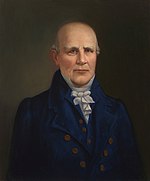
|
Nathaniel Macon | Democratic- Republican |
North Carolina 5 | |
| 8th | October 17, 1803 – March 4, 1805 |
North Carolina 6 | ||||
| 9th | December 2, 1805[e] – March 4, 1807 | |||||
| 10th | October 26, 1807 – March 4, 1809 |

|
Joseph Bradley Varnum | Democratic- Republican |
Massachusetts 4 | |
| 11th | May 22, 1809[e] – March 4, 1811 | |||||
| 12th | November 4, 1811 – March 4, 1813 |

|
Henry Clay | Democratic- Republican |
Kentucky 5 | |
| 13th | May 24, 1813 – January 19, 1814[f] |
Kentucky 2 | ||||
| 13th[g] | January 19, 1814 – March 4, 1815 |

|
Langdon Cheves | Democratic- Republican |
South Carolina 1 | |
| 14th | December 4, 1815 – March 4, 1817 |

|
Henry Clay | Democratic- Republican |
Kentucky 2 | |
| 15th | December 1, 1817 – March 4, 1819 | |||||
| 16th | December 6, 1819 – October 28, 1820[f] | |||||
| 16th[g] | November 15, 1820[e] – March 4, 1821 |

|
John W. Taylor | Democratic- Republican |
New York 11 | |
| 17th | December 4, 1821[e] – March 4, 1823 |

|
Philip P. Barbour | Democratic- Republican |
Virginia 11 | |
| 18th | December 1, 1823 – March 6, 1825[f] |

|
Henry Clay | Democratic- Republican |
Kentucky 3 | |
| 19th | December 5, 1825[e] – March 4, 1827 |

|
John W. Taylor | National Republican (Pro-Adams) | New York 17 | |
| 20th | December 3, 1827 – March 4, 1829 |

|
Andrew Stevenson | Jacksonian | Virginia 9 | |
| 21st | December 7, 1829 – March 4, 1831 | |||||
| 22nd | December 5, 1831 – March 4, 1833 | |||||
| 23rd | December 2, 1833 – June 2, 1834[f] |
Virginia 11 | ||||
| 23rd[g] | June 2, 1834[e] – March 4, 1835 |

|
John Bell | Jacksonian | Tennessee 7 | |
| 24th | December 7, 1835 – March 4, 1837 |

|
James K. Polk | Jacksonian | Tennessee 9 | |
| 25th | September 4, 1837 – March 4, 1839 |
Democratic | ||||
| 26th | December 16, 1839[e] – March 4, 1841 |

|
Robert M. T. Hunter | Whig | Virginia 9 | |
| 27th | May 31, 1841 – March 4, 1843 |
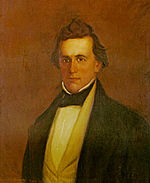
|
John White | Whig | Kentucky 9 | |
| 28th | December 4, 1843 – March 4, 1845 |
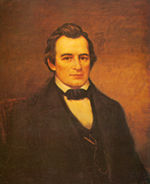
|
John Winston Jones | Democratic | Virginia 6 | |
| 29th | December 1, 1845 – March 4, 1847 |
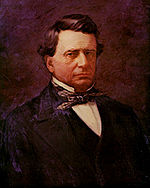
|
John Wesley Davis | Democratic | Indiana 6 | |
| 30th | December 6, 1847[e] – March 4, 1849 |

|
Robert Charles Winthrop | Whig | Massachusetts 1 | |
| 31st | December 22, 1849[e] – March 4, 1851 |

|
Howell Cobb | Democratic | Georgia 6 | |
| 32nd | December 1, 1851 – March 4, 1853 |

|
Linn Boyd | Democratic | Kentucky 1 | |
| 33rd | December 5, 1853 – March 4, 1855 | |||||
| 34th | February 2, 1856[e] – March 4, 1857 |

|
Nathaniel P. Banks | American | Massachusetts 7 | |
| 35th | December 7, 1857 – March 4, 1859 |

|
James Lawrence Orr | Democratic | South Carolina 5 | |
| 36th | February 1, 1860[e] – March 4, 1861 |

|
William Pennington | Republican | New Jersey 5 | |
| 37th | July 4, 1861 – March 4, 1863 |

|
Galusha A. Grow | Republican | Pennsylvania 14 | |
| 38th | December 7, 1863 – March 4, 1865 |

|
Schuyler Colfax | Republican | Indiana 9 | |
| 39th | December 4, 1865 – March 4, 1867 | |||||
| 40th | March 4, 1867 – March 3, 1869[f] | |||||
| 40th[g] | March 3–4, 1869 | 
|
Theodore M. Pomeroy | Republican | New York 24 | |
| 41st | March 4, 1869 – March 4, 1871 |

|
James G. Blaine | Republican | Maine 3 | |
| 42nd | March 4, 1871 – March 4, 1873 | |||||
| 43rd | March 4, 1873 – March 4, 1875 | |||||
| 44th | December 6, 1875 – August 19, 1876[h] |

|
Michael C. Kerr | Democratic | Indiana 3 | |
| 44th[g] | December 4, 1876 – March 4, 1877 |

|
Samuel J. Randall | Democratic | Pennsylvania 3 | |
| 45th | October 15, 1877 – March 4, 1879 | |||||
| 46th | March 18, 1879 – March 4, 1881 | |||||
| 47th | December 5, 1881 – March 4, 1883 |

|
J. Warren Keifer | Republican | Ohio 8 | |
| 48th | December 3, 1883 – March 4, 1885 |

|
John G. Carlisle | Democratic | Kentucky 6 | |
| 49th | December 7, 1885 – March 4, 1887 | |||||
| 50th | December 5, 1887 – March 4, 1889 | |||||
| 51st | December 2, 1889 – March 4, 1891 |

|
Thomas Brackett Reed | Republican | Maine 1 | |
| 52nd | December 8, 1891 – March 4, 1893 |
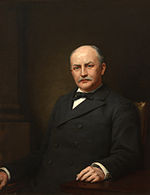
|
Charles Frederick Crisp | Democratic | Georgia 3 | |
| 53rd | August 7, 1893 – March 4, 1895 | |||||
| 54th | December 2, 1895 – March 4, 1897 |

|
Thomas Brackett Reed | Republican | Maine 1 | |
| 55th | March 15, 1897 – March 4, 1899 | |||||
| 56th | December 4, 1899 – March 4, 1901 |
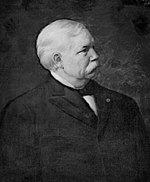
|
David B. Henderson | Republican | Iowa 3 | |
| 57th | December 2, 1901 – March 4, 1903 | |||||
| 58th | November 9, 1903 – March 4, 1905 |

|
Joseph Gurney Cannon | Republican | Illinois 18 | |
| 59th | December 4, 1905 – March 4, 1907 | |||||
| 60th | December 2, 1907 – March 4, 1909 | |||||
| 61st | March 15, 1909 – March 4, 1911 | |||||
| 62nd | April 4, 1911 – March 4, 1913 |
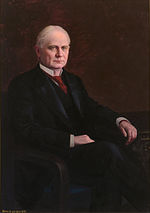
|
Champ Clark | Democratic | Missouri 9 | |
| 63rd | April 7, 1913 – March 4, 1915 | |||||
| 64th | December 6, 1915 – March 4, 1917 | |||||
| 65th | April 2, 1917 – March 4, 1919 | |||||
| 66th | May 19, 1919 – March 4, 1921 |

|
Frederick H. Gillett | Republican | Massachusetts 2 | |
| 67th | April 11, 1921 – March 4, 1923 | |||||
| 68th | December 5, 1923[e] – March 4, 1925 | |||||
| 69th | December 7, 1925 – March 4, 1927 |

|
Nicholas Longworth | Republican | Ohio 1 | |
| 70th | December 5, 1927 – March 4, 1929 | |||||
| 71st | April 15, 1929 – March 4, 1931 | |||||
| 72nd | December 7, 1931 – March 4, 1933 |

|
John Nance Garner | Democratic | Texas 15 | |
| 73rd | March 9, 1933 – August 19, 1934[h] |

|
Henry Thomas Rainey | Democratic | Illinois 20 | |
| 74th | January 3, 1935 – June 4, 1936[h] |

|
Jo Byrns | Democratic | Tennessee 5 | |
| 74th[g] | June 4, 1936 – January 3, 1937 |
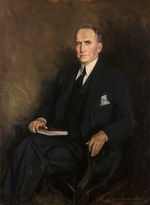
|
William B. Bankhead | Democratic | Alabama 7 | |
| 75th | January 5, 1937 – January 3, 1939 | |||||
| 76th | January 3, 1939 – September 15, 1940[h] | |||||
| 76th[g] | September 16, 1940 – January 3, 1941 |

|
Sam Rayburn | Democratic | Texas 4 | |
| 77th | January 3, 1941 – January 3, 1943 | |||||
| 78th | January 6, 1943 – January 3, 1945 | |||||
| 79th | January 3, 1945 – January 3, 1947 | |||||
| 80th | January 3, 1947 – January 3, 1949 |

|
Joseph W. Martin Jr. | Republican | Massachusetts 14 | |
| 81st | January 3, 1949 – January 3, 1951 |

|
Sam Rayburn | Democratic | Texas 4 | |
| 82nd | January 3, 1951 – January 3, 1953 | |||||
| 83rd | January 3, 1953 – January 3, 1955 |

|
Joseph W. Martin Jr. | Republican | Massachusetts 14 | |
| 84th | January 3, 1955 – January 3, 1957 |

|
Sam Rayburn | Democratic | Texas 4 | |
| 85th | January 3, 1957 – January 3, 1959 | |||||
| 86th | January 7, 1959 – January 3, 1961 | |||||
| 87th | January 3, 1961 – November 16, 1961[h] | |||||
| 87th[g] | January 10, 1962 – January 3, 1963 |

|
John W. McCormack | Democratic | Massachusetts 12 | |
| 88th | January 9, 1963 – January 3, 1965 |
Massachusetts 9 | ||||
| 89th | January 4, 1965 – January 3, 1967 | |||||
| 90th | January 10, 1967 – January 3, 1969 | |||||
| 91st | January 3, 1969 – January 3, 1971 | |||||
| 92nd | January 21, 1971 – January 3, 1973 |

|
Carl Albert | Democratic | Oklahoma 3 | |
| 93rd | January 3, 1973 – January 3, 1975 | |||||
| 94th | January 14, 1975 – January 3, 1977 | |||||
| 95th | January 4, 1977 – January 3, 1979 |
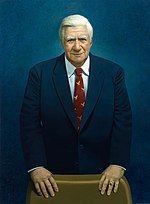
|
Tip O'Neill | Democratic | Massachusetts 8 | |
| 96th | January 15, 1979 – January 3, 1981 | |||||
| 97th | January 5, 1981 – January 3, 1983 | |||||
| 98th | January 3, 1983 – January 3, 1985 | |||||
| 99th | January 3, 1985 – January 3, 1987 | |||||
| 100th | January 6, 1987 – January 3, 1989 |

|
Jim Wright | Democratic | Texas 12 | |
| 101st | January 3, 1989 – June 6, 1989[f] | |||||
| 101st[g] | June 6, 1989 – January 3, 1991 |

|
Tom Foley | Democratic | Washington 5 | |
| 102nd | January 3, 1991 – January 3, 1993 | |||||
| 103rd | January 5, 1993 – January 3, 1995 | |||||
| 104th | January 4, 1995 – January 3, 1997 |

|
Newt Gingrich | Republican | Georgia 6 | |
| 105th | January 7, 1997 – January 3, 1999[f] | |||||
| 106th | January 6, 1999 – January 3, 2001 |
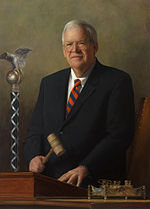
|
Dennis Hastert | Republican | Illinois 14 | |
| 107th | January 3, 2001 – January 3, 2003 | |||||
| 108th | January 7, 2003 – January 3, 2005 | |||||
| 109th | January 3, 2005 – January 3, 2007 | |||||
| 110th | January 4, 2007 – January 3, 2009 |

|
Nancy Pelosi | Democratic | California 8 | |
| 111th | January 6, 2009 – January 3, 2011 | |||||
| 112th | January 5, 2011 – January 3, 2013 |

|
John Boehner | Republican | Ohio 8 | |
| 113th | January 3, 2013 – January 3, 2015 | |||||
| 114th | January 6, 2015 – October 29, 2015[f] | |||||
| 114th[g] | October 29, 2015 – January 3, 2017 |

|
Paul Ryan | Republican | Wisconsin 1 | |
| 115th | January 3, 2017 – January 3, 2019 | |||||
| 116th | January 3, 2019 – January 3, 2021 |

|
Nancy Pelosi | Democratic | California 12 | |
| 117th | January 3, 2021 – January 3, 2023 | |||||
| 118th | January 7, 2023[e] – present |

|
Kevin McCarthy | Republican | California 20 | |
| References:[5][6] | ||||||
Notes
[edit]- ^ a b During James K. Polk's tenure as speaker the Jacksonian bloc amalgamated into the modern Democratic Party.
- ^ a b John Taylor served as speaker twice in the 1820s; initially he was as a member of the Democratic–Republican Party, and later, when the party began to fracture, he sided with its pro–Adams faction.
- ^ a b Frederick Muhlenberg served as speaker twice in the 1790s, before political factions coalesced into formal parties; initially he identified with the pro–administration faction, but later he aligned himself with the anti–administration faction.
- ^ The district listed is the district the speaker represented at the time they were in office, which may be different in different Congresses due to redistricting.
- ^ a b c d e f g h i j k l m n o Multi-ballot election.
- ^ a b c d e f g h Resigned from office and from Congress.
- ^ a b c d e f g h i j Intra-term special election.
- ^ a b c d e Died in office.
See also
[edit]- List of Speaker of the United States House of Representatives elections
- List of current presidents of legislatures, presiding officers of legislative assemblies worldwide
- History of the United States House of Representatives
References
[edit]- ^ a b Forte, David F. "Essays on Article I: Speaker of the House". Heritage Guide to The Constitution. Heritage Foundation. Retrieved March 23, 2019.
- ^ Relyea, Harold C. (August 5, 2005). "Continuity of Government: Current Federal Arrangements and the Future" (PDF). CRS Report for Congress. Washington, D.C.: Congressional Research Service, the Library of Congress. pp. 2–4. Retrieved March 23, 2019.
- ^ a b "Speaker Elections Decided by Multiple Ballots". history.house.gov. United States House of Representatives. Retrieved September 28, 2016.
- ^ Heitshusen, Valerie; Beth, Richard S. (January 4, 2019). "Speakers of the House: Elections, 1913–2019" (PDF). RL30857. Washington, D.C.: Congressional Research Service. Retrieved March 23, 2019.
- ^ "List of Speakers of the House". Washington, D.C.: Office of the Historian, United States House of Representatives. Retrieved January 24, 2022.
- ^ Speakers of the House of Representatives, 1789-2021. Amenia, New York: Grey House Publishing. 2021. ISBN 978-1-64265-834-7.
![]() This article incorporates public domain material from websites or documents of the Federal government of the United States.
This article incorporates public domain material from websites or documents of the Federal government of the United States.
- "A Century of Lawmaking for a New Nation: U.S. Congressional Documents and Debates, 1774–1875". memory.loc.gov. Washington, D.C.: Library of Congress.
- "Congressional Record (Bound Edition)". govinfo.gov. Washington, D.C.: United States Government Publishing Office.
- "List of Speakers of the House". Washington, D.C.: Office of the Historian, United States House of Representatives.
Further reading
[edit]- Follett, Mary Parker (1909) [First edition, 1896]. The speaker of the House of Representatives. New York, New York: Longmans, Greene, and Company. Retrieved March 18, 2019 – via Internet Archive, digitized in 2007.
- House Document 108–204 – The Cannon Centenary Conference: The Changing Nature of the Speakership
